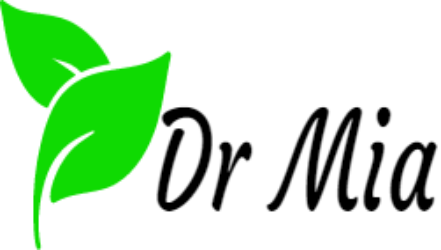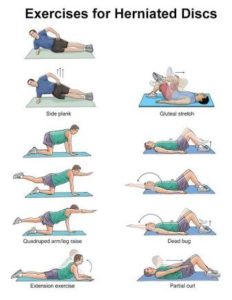
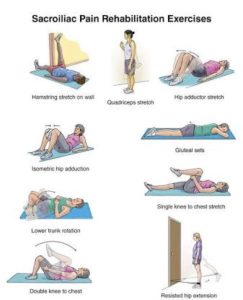
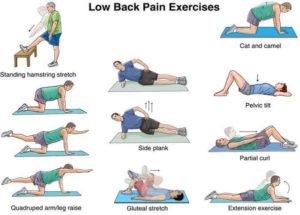
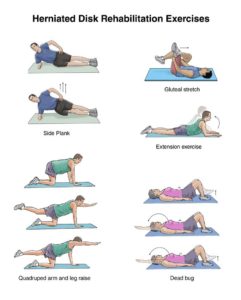
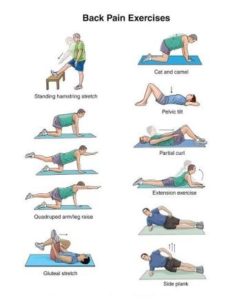
Common Causes and Conditions of Lower Back Pain
1. Muscle & Soft Tissue Issues
- Lumbar Strain – Overstretched muscles/ligaments
- Piriformis Syndrome – Tight piriformis muscle irritating sciatic nerve
- Myofascial Pain – Trigger points in quadratus lumborum
2. Disc & Nerve Related
- Lumbar Herniated Disc – Nerve root compression (sciatica)
- Degenerative Disc Disease – Disc dehydration with age
- Spinal Stenosis – Narrowed spinal canal causing leg pain when walking
3. Joint & Structural Problems
- Facet Joint Arthritis – Stiff, painful spinal joints
- Spondylolisthesis – Vertebral slippage (often L4-L5)
- Sacroiliac Joint Dysfunction – Inflammatory pain radiating to buttock
4. Systemic & Referred Pain
- Kidney Stones/Infection – Flank pain with urinary symptoms
- Endometriosis – Cyclic pain in women
- Ankylosing Spondylitis – Inflammatory arthritis with morning stiffness
Rehab Exercises at Home After and Between TCM Treatments
1. Mobility & Decompression Exercises
A. Pelvic Clock
- Lie on back, knees bent
- Gently rock pelvis forward/backward/side-to-side
- Reps: 10 circles each direction
- Benefits: Restores lumbar-pelvic rhythm
B. Nerve Flossing (Sciatic)
- Seated, extend one leg with flexed ankle
- Nod head forward while straightening leg
- Reps: 8-10 gentle oscillations
- Benefits: Reduces nerve adhesions
C. Supported Bridge
- Lie with calves on chair, knees at 90°
- Lift hips slightly, hold 20 seconds
- Reps: 3-5x
- Benefits: Decompresses lumbar discs
2. Core Stabilization Exercises
A. Dead Bug
- On back, arms/knees at 90°
- Slowly extend opposite arm/leg while bracing core
- Reps: 8-10 per side
- Benefits: Trains anti-extension stability
B. Side Plank (Modified)
- Knees bent, lift hips to align shoulders-knees
- Hold 15-20 seconds
- Reps: 3x per side
- Benefits: Strengthens obliques/QL muscles
C. McGill Curl-Up
- One knee bent, hands under lumbar arch
- Lift head/shoulders only 2 inches
- Hold 8-10 seconds
- Reps: 5-8x
- Benefits: Safe core activation without disc compression
3. TCM-Inspired Therapies
A. Moxibustion on BL-23/25
- Warm “Shenshu” (BL-23) and “Dachangshu” (BL-25) points
- Duration: 5-10 minutes
- Benefits: Warms Kidney Yang for chronic cold-type pain
B. Gua Sha Along Bladder Meridian
- Use jade tool with oil from sacrum to mid-back
- Direction: Always downward strokes
- Benefits: Releases muscle stagnation
C. Herbal Hot Pack
- Apply cloth pouch with steamed Duhuo (Angelica root) + Mugwort
- Duration: 15 minutes pre-exercise
- Benefits: Relaxes tendons, dispels cold-damp
Precautions & Recommendations
✔ First movement of day: Roll to side before sitting up
✔ Sitting posture: Use lumbar roll support
✔ Acute phase: Prioritize decompression over strengthening
✖ Avoid: Toe touches, sit-ups, prolonged standing
TCM Dietary Support:
- Black beans + Walnuts for Kidney essence
- Turmeric + Ginger tea for inflammation
When to Seek Professional Help:
- Progressive leg weakness/numbness
- Bowel/bladder dysfunction
- Night pain unrelieved by position changes
Note: These protocols combine modern rehab principles with TCM meridian theory. For personalized herbal formulas or acupuncture point selection, consult your licensed TCM practitioner.
Lower Back Pain: TCM Pattern-Specific Modifications
1. Acute vs. Chronic Presentations
Acute (First 72 Hours – “Excess” Pattern)
▸ TCM Focus: Drain stagnation, reduce swelling
▸ Exercises:
- Supported Bridge (Isometric) – 10-sec holds only
- Prone Lying with Belly Breathing – Activates diaphragm without spinal load
- Ankle Pumps – Promotes lymphatic drainage
▸ TCM Adjuncts: - Bleeding Cupping at BL-40 (Weizhong) for severe blood stasis
- Cold Herbal Compress (Huangbai + Dahuang)
Chronic (>3 Months – “Deficiency” Pattern)
▸ TCM Focus: Tonify Kidney, nourish tendons
▸ Exercises:
- Tai Chi “Wave Hands Like Clouds” – Weight shifting with spinal rotation
- Wall Squats with Back Support – Builds endurance
- Swiss Ball Cat-Cow – Enhances proprioception
▸ TCM Adjuncts: - Moxa on GV-4 (Mingmen) + BL-23 (Shenshu)
- Deer Antler Gelatin (Lurong Jiao) for Kidney Yang deficiency
2. TCM Pattern Differentiation
A. Cold-Damp Obstruction
▶ Signs: Worse in damp weather, stiffness improves with heat
▶ Modifications:
- Exercises: Add Qi Gong “Holding the Moon” (static standing with arm circle) to generate internal heat
- Herbs: Topical Safflower (Honghua) Oil Massage before exercise
- Diet: Ginger + Brown Sugar Tea pre-workout
B. Blood Stasis
▶ Signs: Stabbing pain, visible purple veins, dark tongue
▶ Modifications:
- Exercises: Vibration Foam Rolling on glutes/hamstrings first
- Acupressure: SP-10 (Xuehai) + BL-17 (Geshu) daily
- Cupping: Purple/black marks indicate successful stasis removal
C. Kidney Deficiency
▶ Yang Deficiency: Cold limbs, fatigue, frequent urination
- Moxa Sequence: GV-4 → BL-23 → KI-3 (Taixi)
- Exercise: “Standing Like a Tree” 5 mins/day
▶ Yin Deficiency: Night pain, dry throat, red tongue - Hydration: Drink Ophiopogon (Maidong) Tea post-exercise
- Movement: Water Tai Chi (slow pool exercises)
3. Pregnancy-Related Low Back Pain
TCM Diagnosis: “Kidney and Chong Mai weakness”
Safe Modifications:
▸ Exercises:
- Pelvic Floor Activation with Kegels during cat-cow
- Side-Lying Clamshells for gluteus medius
- Birth Ball Circles for sacral mobility
▸ TCM Therapies: - Moxa on BL-67 (Zhiyin) – Only after 37 weeks for breech
- Acupressure on SP-6 (Sanyinjiao) – Light stimulation only
▸ Contraindications: - Avoid deep forward folds after 2nd trimester
- No gua sha on lower back during pregnancy
Progressive Rehabilitation Protocol
Phase 1 (Acute):
- Days 1-3: Moxa + topical Dit Da Jow
- Days 4-7: Begin nerve flossing + 10-sec dead bugs
Phase 2 (Subacute):
- Weeks 2-4: Add McGill big 3 exercises
- Week 5+: Introduce farmer’s carries with herbal wrist weights
Phase 3 (Maintenance):
- Monthly: Tune-up acupuncture along Governing Vessel
- Seasonal: Herbal patch (Eucommia + Cibotium) during weather changes
TCM Lifestyle Prescriptions
- Sleep: Place wormwood pillow under lumbar curve
- Work: Stand on acupressure mat during desk work
- Bathing: Add Achyranthes root (Niuxi) to foot soaks
Key Herbal Formulas:
- Du Huo Ji Sheng Tang (Cold-Damp type)
- Shao Yao Gan Cao Tang (Muscle spasms)
- You Gui Wan (Kidney Yang deficiency)

